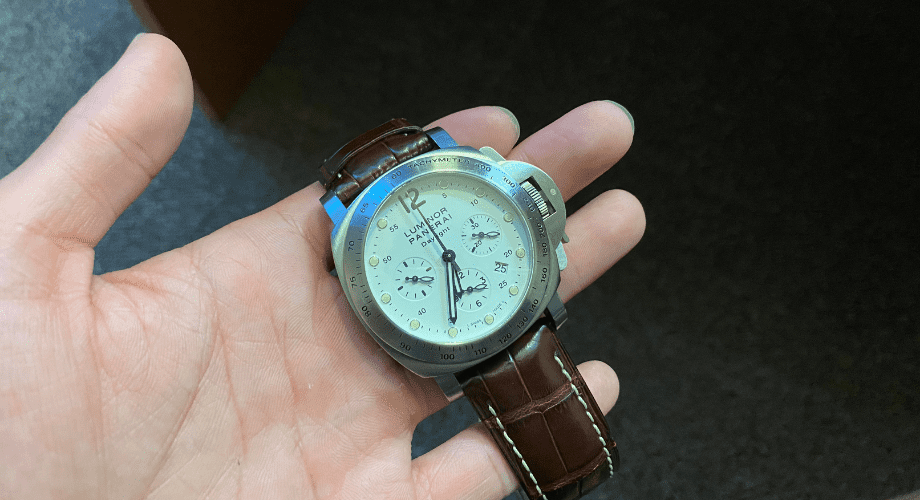
Ever since a young age, I have always been an active individual. I love working out and lifting weights to get stronger and improve my physique, and I also love playing sports such as basketball and soccer. But I am also a sweaty person whenever I am active. A question remained in my mind after I got into watches: does sweat damage watches? After doing research, I found the answer:
Sweat can damage watches if it is not adequately cleaned and maintained. Sweat contains salt and other chemicals that can corrode and discolor metal and leather components, such as the watch’s case, band, and movement. It is important to clean your watch regularly and avoid exposing it to moisture and extreme temperatures.
Read on to view my in-depth explanation of how sweat can damage a watch and view the rest of the article!
Does Sweat Damage a Watch?
I absolutely love being active: I enjoy working out and playing multiple sports. But, I am also a sweaty person as well when I go to the gym and work out, which made me wonder whether sweat negatively damages watches or not.
In another blog post, I wrote an in-depth article on whether you should wear a watch to the gym. In the post, I did a 5-day experiment of wearing my Breitling to the gym, and on the third day, I was on the treadmill. After the workout, there was a good amount of sweat on the case and bracelet. This inspired me to research if sweat damages watches and this is what I found:
Sweat contains salt and other chemicals that can be harmful to watches if they are not properly cleaned and maintained. If left to sit on the watch, these substances can corrode a watch’s components such as the case, bracelet, and movement. This can cause discoloration, rust, and even affect the performance and accuracy of the watch.
However, not all watches are created equal in terms of durability. For example, stainless steel watches are more resistant to corrosion and rust than other materials, such as bronze or brass. Watches with high-quality water resistance can also withstand exposure to sweat and other forms of moisture, but I believe it is still important to follow the manufacturer’s guidelines for care and maintenance.
If you want to check out the article that I wrote about whether wearing a watch to the gym is good or not, you can click right here. The post goes into my 5-day experiment and conclusions, and whether I believe you should wear your watch to the gym or not.
Does Sweat Make Watches Smell Bad?

Another question often asked is does sweat make watches smell bad. I’ve wondered about this myself, and I found that sweat can contribute to a bad or unpleasant odor on watches. Over time, the bacteria in sweat can build up on the watch band and cause a bad smell.
I found this is especially true with watch bands made out of leather or fabric (such as a NATO strap) because it absorbs moisture and chemicals from sweat like a sponge, which can lead to your watch smelling bad.
I’ve experienced this before. My Panerai Luminor Daylight Chronograph has a brown leather watch band, and in the summer when I wear it in hot weather, the band tends to get really sweaty and sometimes I forget to clean it or wipe it down and it starts to smell bad. This shows how sweat can cause watches to smell bad.
Ways To Prevent Watch Damage and Odor From Sweat
If you are someone who has dealt with this problem before or is looking for ways to prevent watch damage or sweat odor from happening in the first place, I have found several ways to mitigate these issues through my experience and research. Here is what I found:
1) Clean your watch regularly
This can be done with a soft cloth, warm water, and mild soap. Make sure to rinse the watch thoroughly to remove all soap residue and handle your watch with extra care. This will help remove the salt and other chemicals that may cause damage or odor to your watch. I recommend being very careful with water if your watch has weak water resistance.
2) Avoid exposing your watch to extreme temperatures.
Excessive heat and cold can cause the metal to expand and contract, which can lead to damage over time. Excessive heat temperatures can also lead to damaging your watch from sweat. I recommend being cautious of where you bring your watches and being aware of these different temperatures.
3) Store your watch in a dry place.
Leaving your watch near moisture can accelerate the corrosion process, so make sure your watch is stored in a cool, dry place when not in use. This will help improve the lifespan of your watch and prevent it from corroding.
4) Avoid wearing your watch in the shower or limit wearing a watch while swimming
While some watches are designed to be water-resistant such as dive watches, it’s always best to be cautious and avoid exposing your watch to water as much as possible because it can potentially cause significant damage to your watch. Even if you do take your watch on a swim or dive, I suggest that you always keep an eye on it and handle it with the utmost care.
Conclusion
In conclusion, sweat can damage watches if it is not properly cleaned and maintained. However, with proper care and attention to some of the tips I mentioned above, you can keep your watch in good condition for years to come without worrying about sweat damaging your watch. Remember to clean your watch regularly, avoid exposing it to extreme temperatures and moisture, and follow the manufacturer’s guidelines for care and maintenance. With these steps, you can enjoy your timepiece for many years!
If you’re someone who is looking for the best watches on the market, I have just the resource for you. On another page on my website, I have given my top recommendations for the best watches and watch products. Click here to see it!
